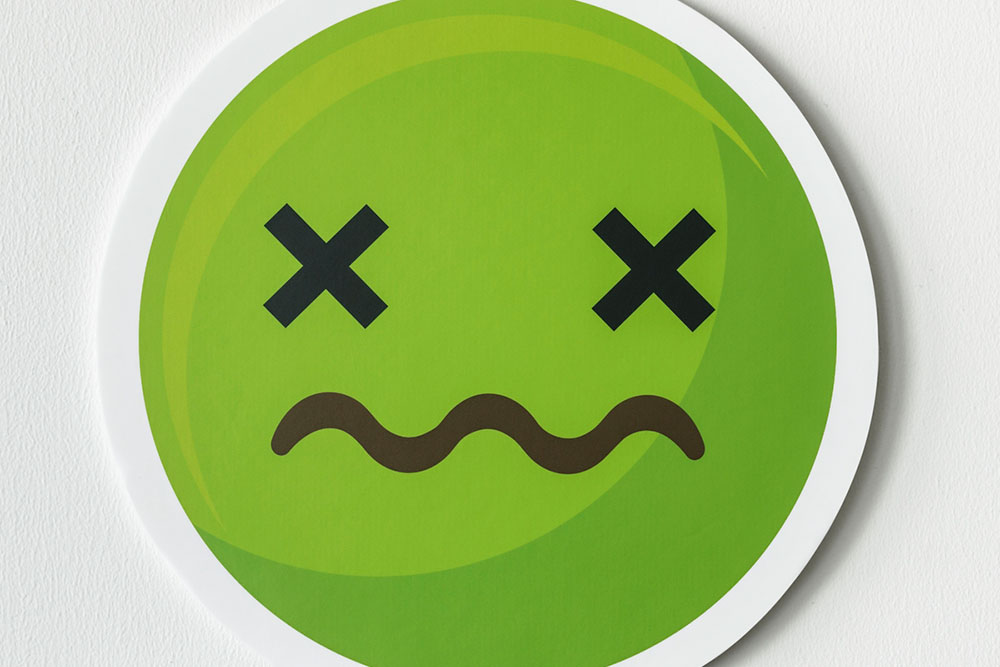Afraid Of Throwing Up? You May Have Emetophobia
Published on July 5th, 2019
Updated on January 8th, 2024

Emetophobia is a term used for people who fear throwing up. It is a condition in which a person has an irrational fear of vomiting. People with emetophobia will fear throwing up or being exposed to a situation in which they may throw up.
People with emetophobia are suffering from a specific phobia. A specific phobia is a fear of a specific situation or object. People who suffer from a specific phobia have significant anxiety and stress reactions when confronted with their feared situation.
What It’s Like To Have Emetophobia
A person with emetophobia has a distressing fear of throwing up. Any situation that may cause them to throw up creates a great deal of anxiety.
Sponsored by

Choose a therapist to work with and start healing with 20% off from BetterHelp.
Click HereSituations that may cause extreme anxiety and discomfort for an affected person include:
- The possibility of getting sick
- The possibility of throwing up
- The possibility of feeling embarrassed after throwing up
- Situations where they may be triggered to throw up
Symptoms of emetophobia tend to center around avoidance and fear of throwing up. A person with emetophobia will engage in behaviors that prevent them from throwing up. They show symptoms of avoidance and stress in situations that remind them of throwing up.
Symptoms of emetophobia include:
- Efforts to not get sick (avoiding germs, doctor offices, people who are sick, etc.)
- Avoiding physical contact with others to prevent transmission of germs
- Refusal to touch things that are dirty or have an odor
- Avoiding foods and scents that remind them of vomiting
- Fear of food-borne contaminants (over-cleaning or overcooking food)
- Refusal to eat or drink unfamiliar food or drinks
- Restricting diet and activities to omit anything that may cause them to throw up
- Showing signs of agoraphobia
- Avoidance of stressful situations or responsibilities
- Engaging in rituals to prevent throwing up or getting sick
- Obsessive research of ways a person can get sick or things that can cause them to throw up
- Fleeing from situations where someone else may throw up
- Feeling nauseated by the sound of gagging
What Triggers Emetophobia?
There are several triggers that can cause emetophobia. The primary cause of emetophobia is having a bad experience with throwing up. For some people, throwing up can be traumatic. It can cause an upsetting and stressful memory, which creates a fear of throwing up.
People may throw up due to being sick, eating something bad, or getting nervous. Sometimes it is uncontrollable vomiting or feeling embarrassed after vomiting that creates the fear.
Emetophobia can co-occur with mental health disorders. Such mental health disorders that can affect emetophobia include:
Obsessive-compulsive disorder. People with obsessive compulsive disorder (OCD) suffer from obsessive thoughts. They also suffer from compulsive behaviors. Obsessive thoughts and avoiding vomiting can be caused by OCD.
Anxiety disorders. Suffering from an anxiety disorder can cause a person to develop a phobia. A phobia is a trigger for fear. Emetophobia can stem from anxious thought patterns and reactions. This is especially true for people with family members who suffer from anxiety.
Social phobia. People with a social phobia suffer from anxiety when placed in social situations. They fear any situation in which they can be embarrassed in public. This includes getting sick in public. This is especially true for people who have gotten sick in public in the past.
Hypochondria. Hypochondria is a condition in which a person is constantly in fear of getting sick. This fear is often so strong that they convince themselves they are sick even though they are not. Fear of throwing up can be caused by a fear or obsession about getting sick.
Can You Overcome Emetophobia?
People with emetophobia can benefit from therapy. Therapy for emetophobia requires exposure to many feared situations. It focuses on targeting fears about throwing up.
The goal of therapy for emetophobia is to minimize the stress response and fears of throwing up. This often includes two types of therapy:
Exposure Therapy is a form of therapy that exposes people to their fears. It uses a hierarchy approach. This means that the person will begin with facing their least feared situation and work their way up to their most feared situation. This helps to reduce the stress reaction when confronted with a trigger.
Cognitive-Behavioral Therapy (CBT) helps the affected person challenge their fears about throwing up. It teaches them coping skills to use in the moment of anxiety.
CBT also teaches the affected person how to cope with feeling uncomfortable. With time, they learn that not every feared situation will lead to throwing up.
CBT takes the catastrophe away from throwing up. This means that if the affected person learns that if they do throw up, it will be uncomfortable, but will not have a devastating impact on their life.
Sponsored by

Find an affordable therapist online with 20% off from BetterHelp.
Click Here






Leave A Reply